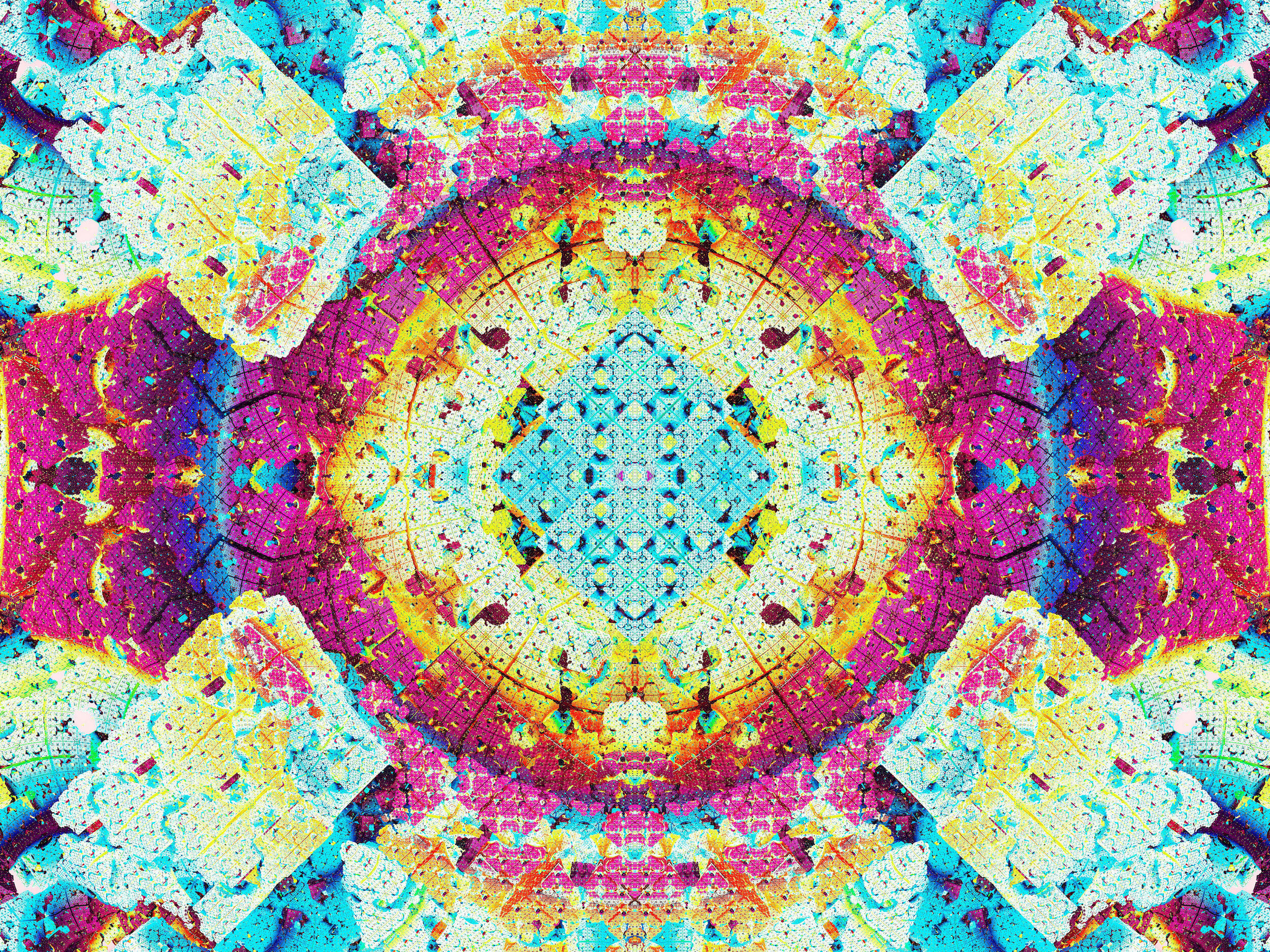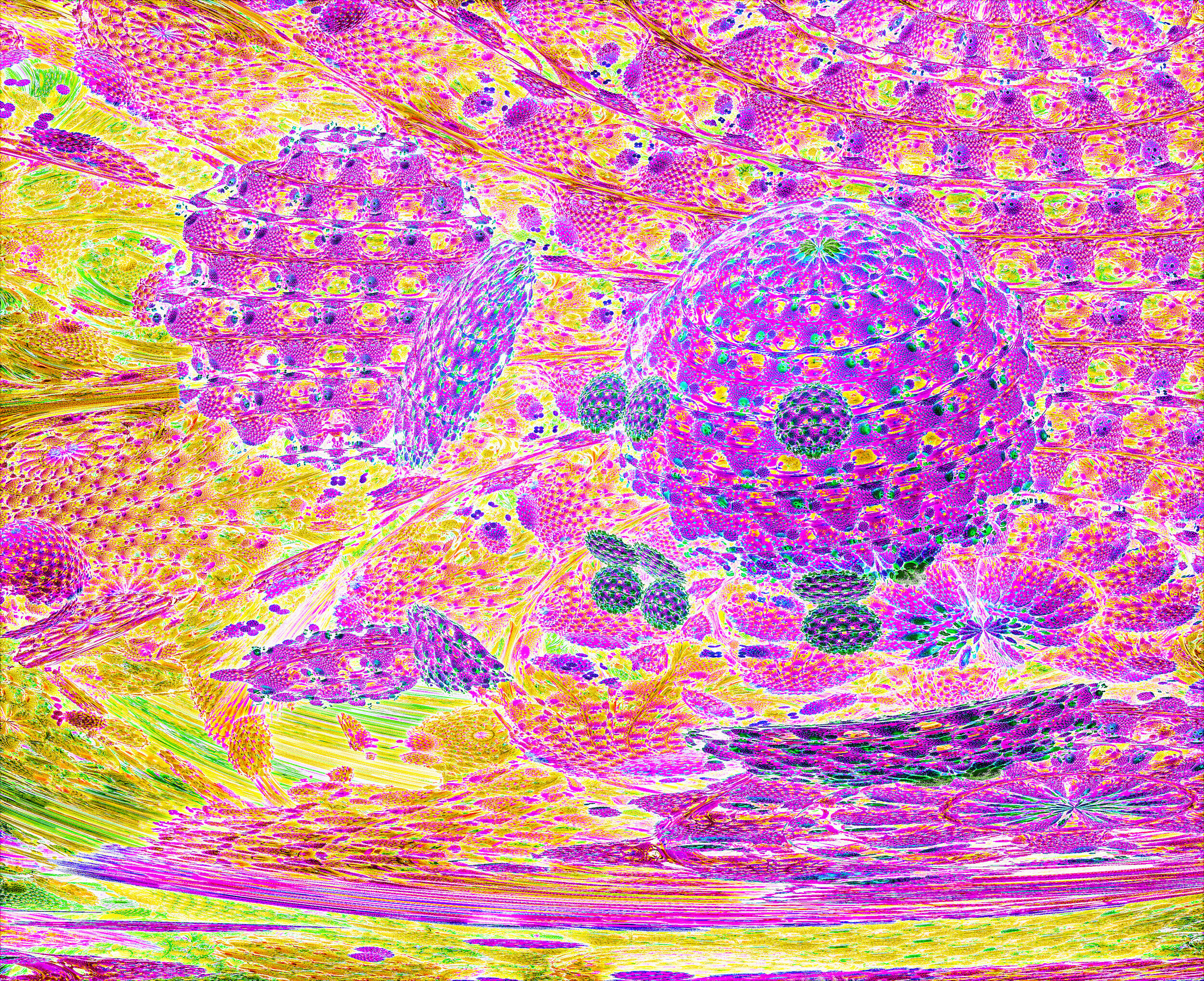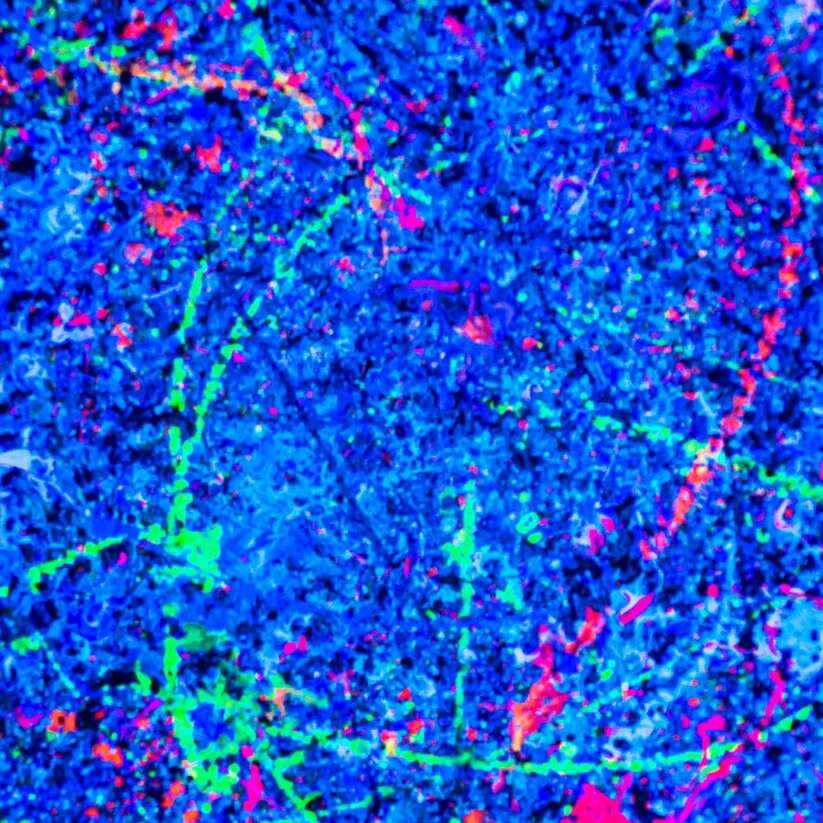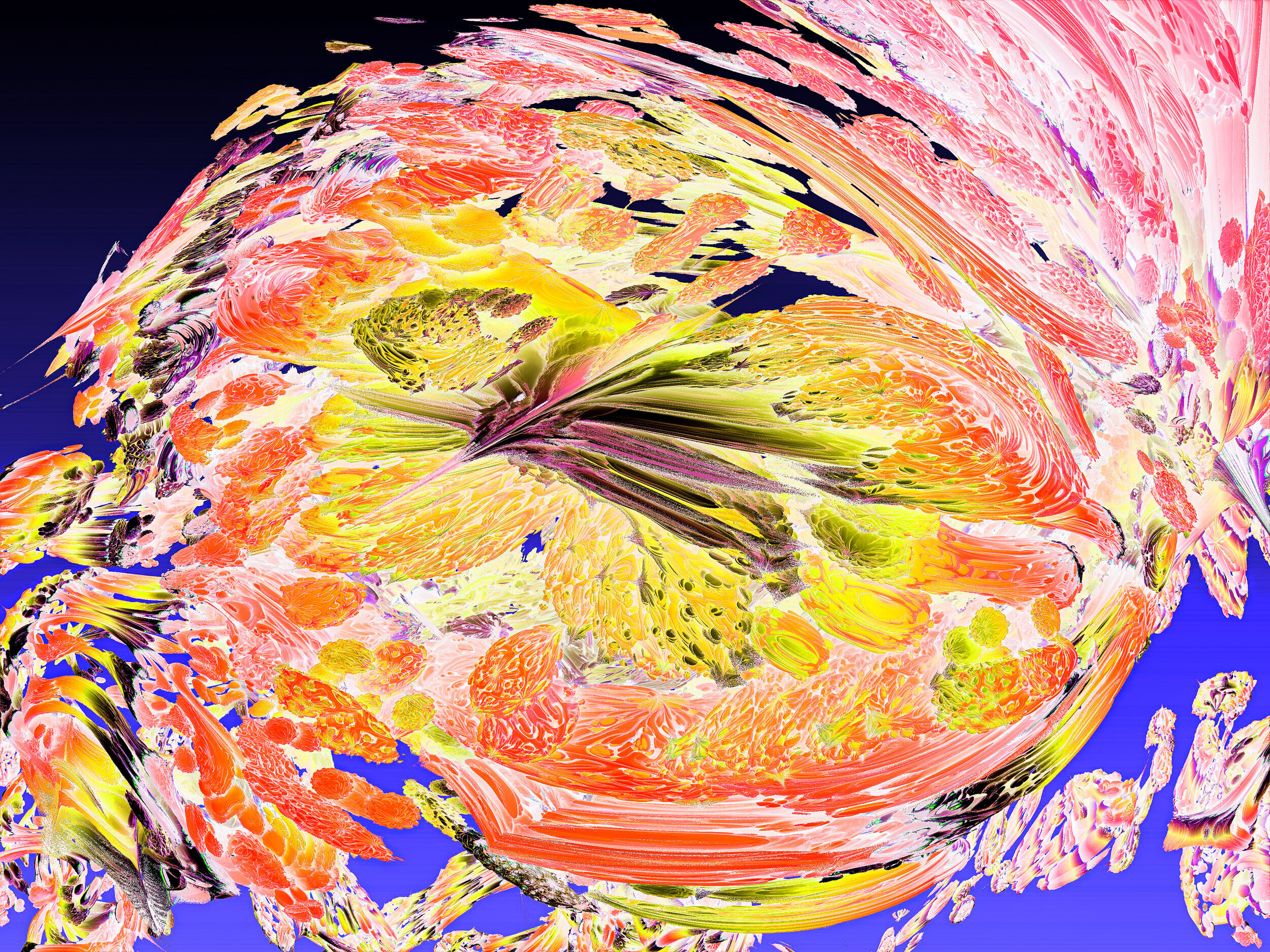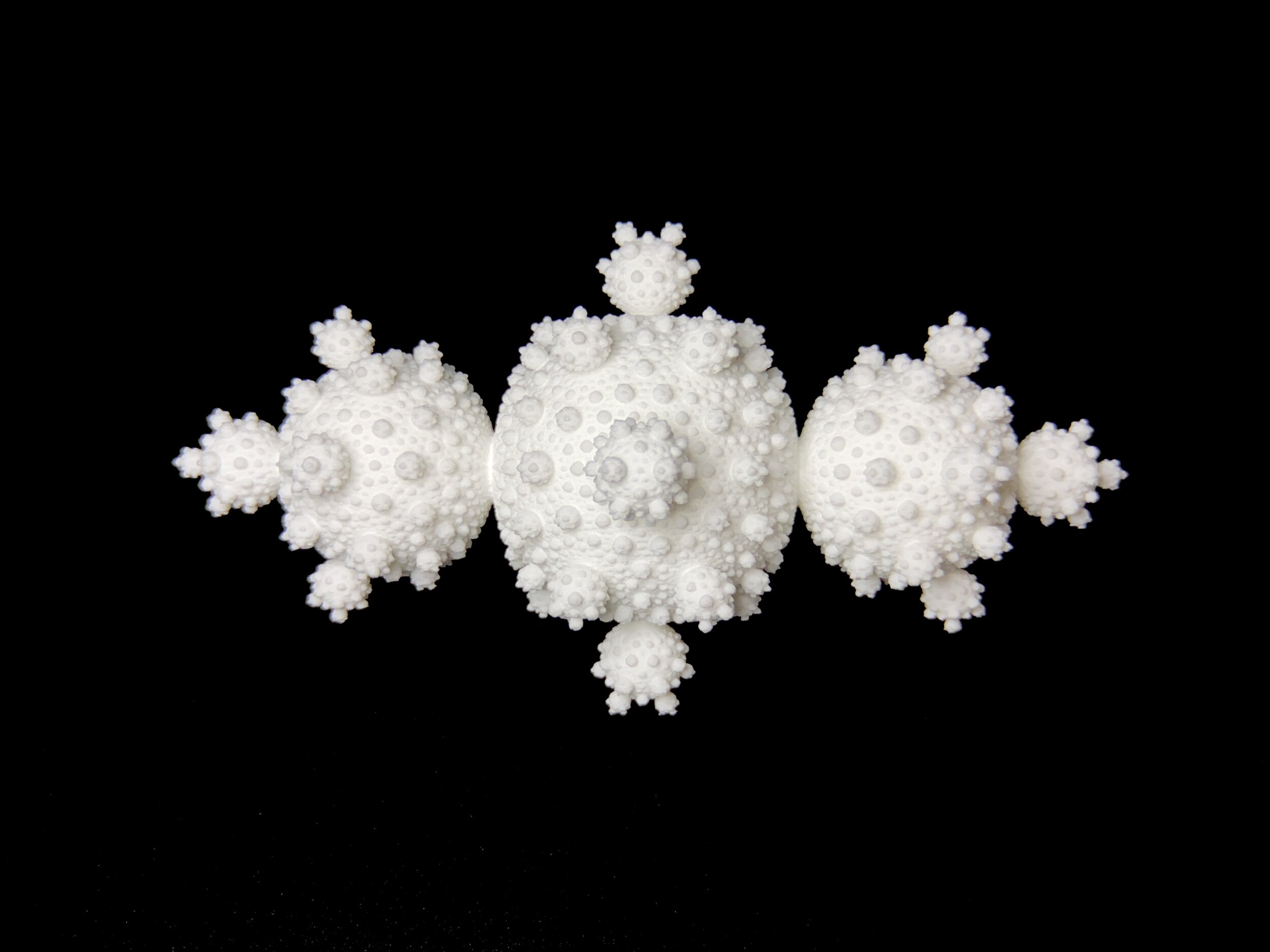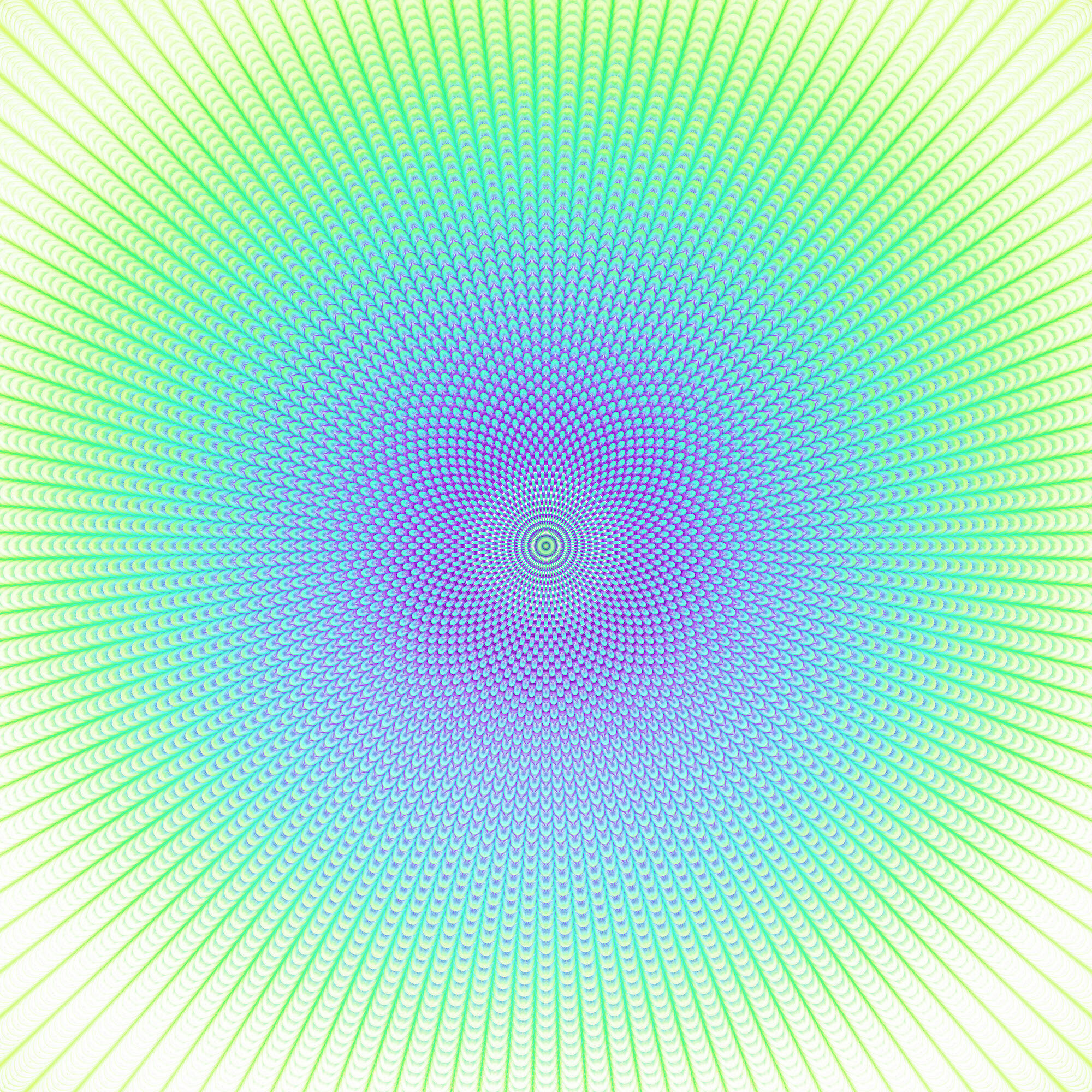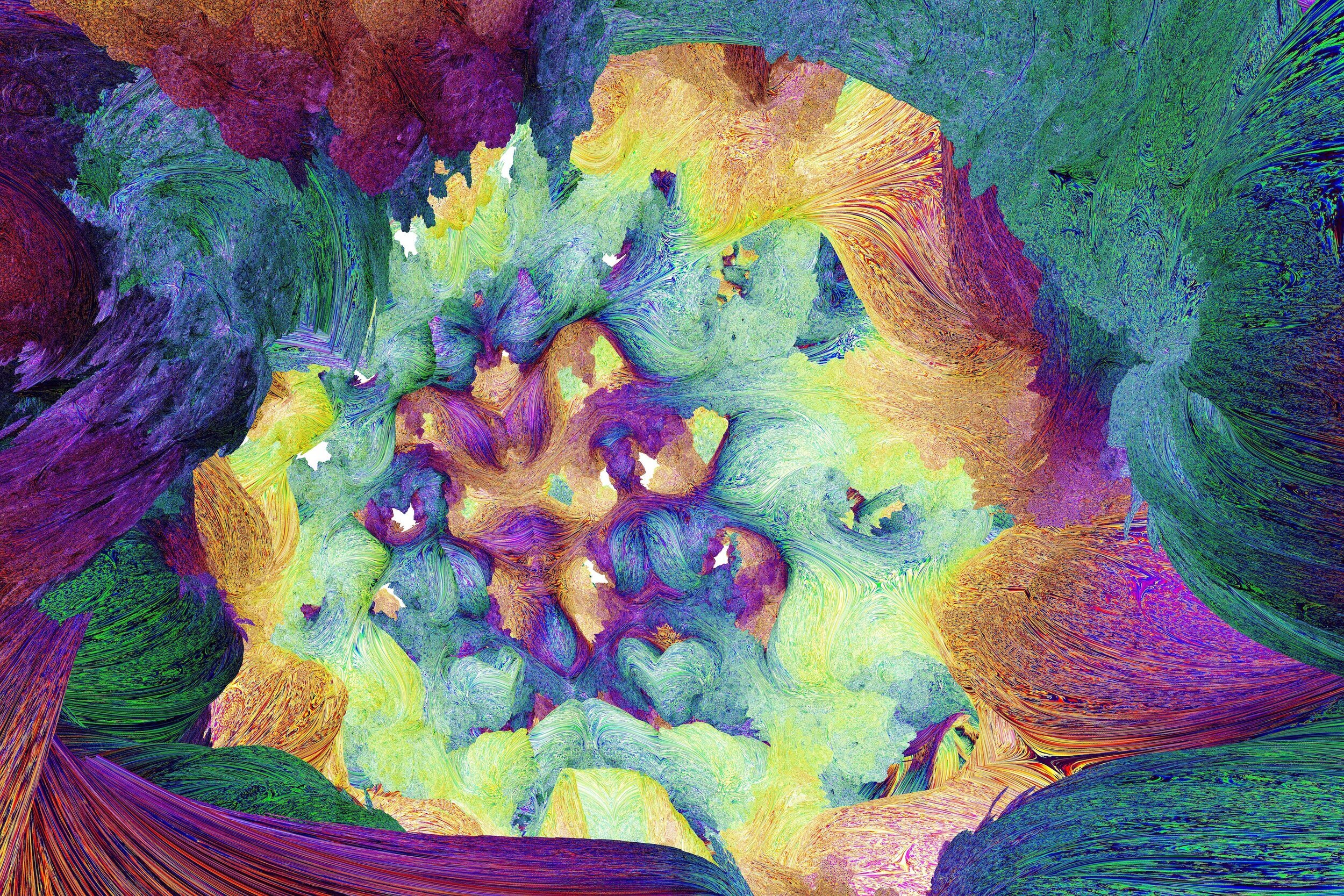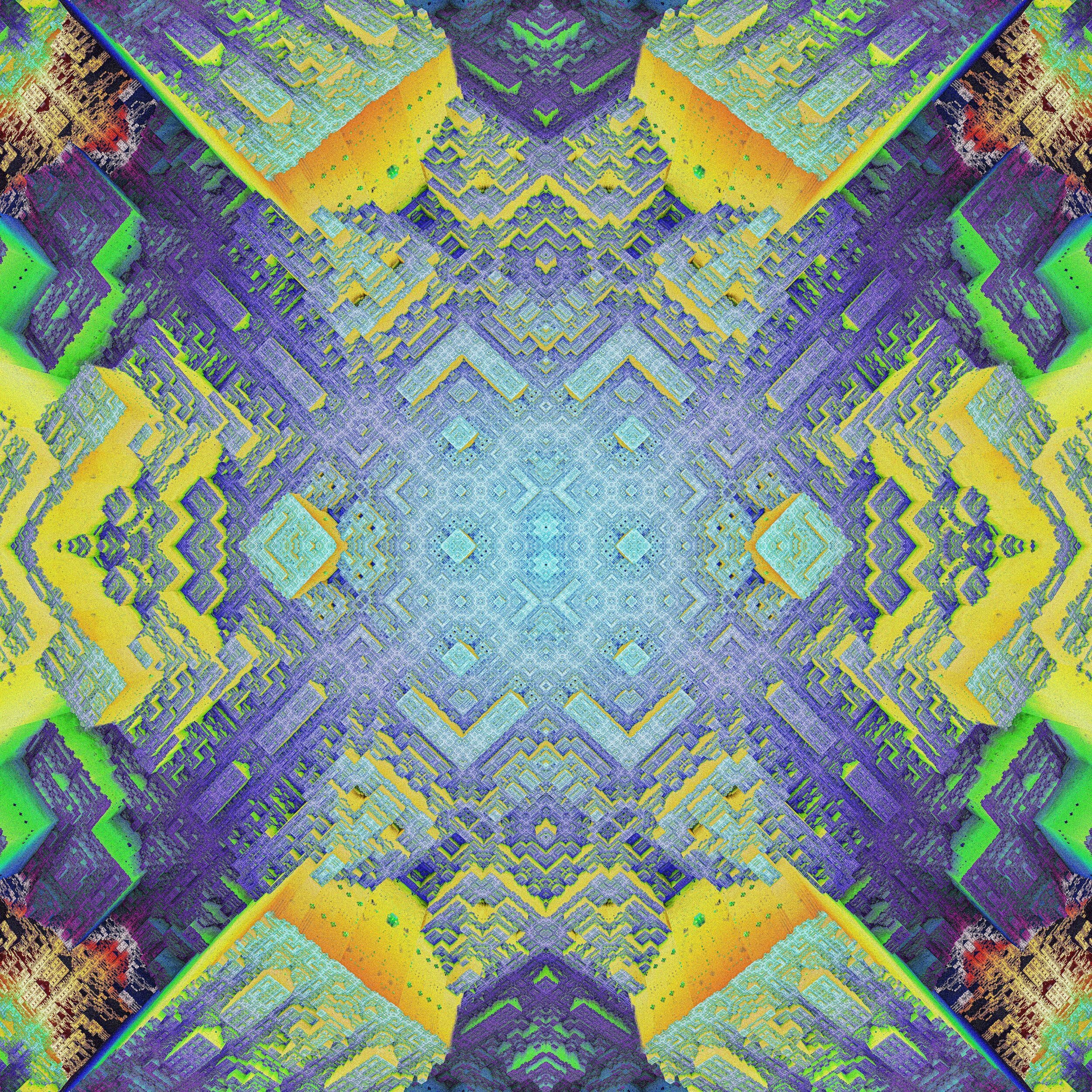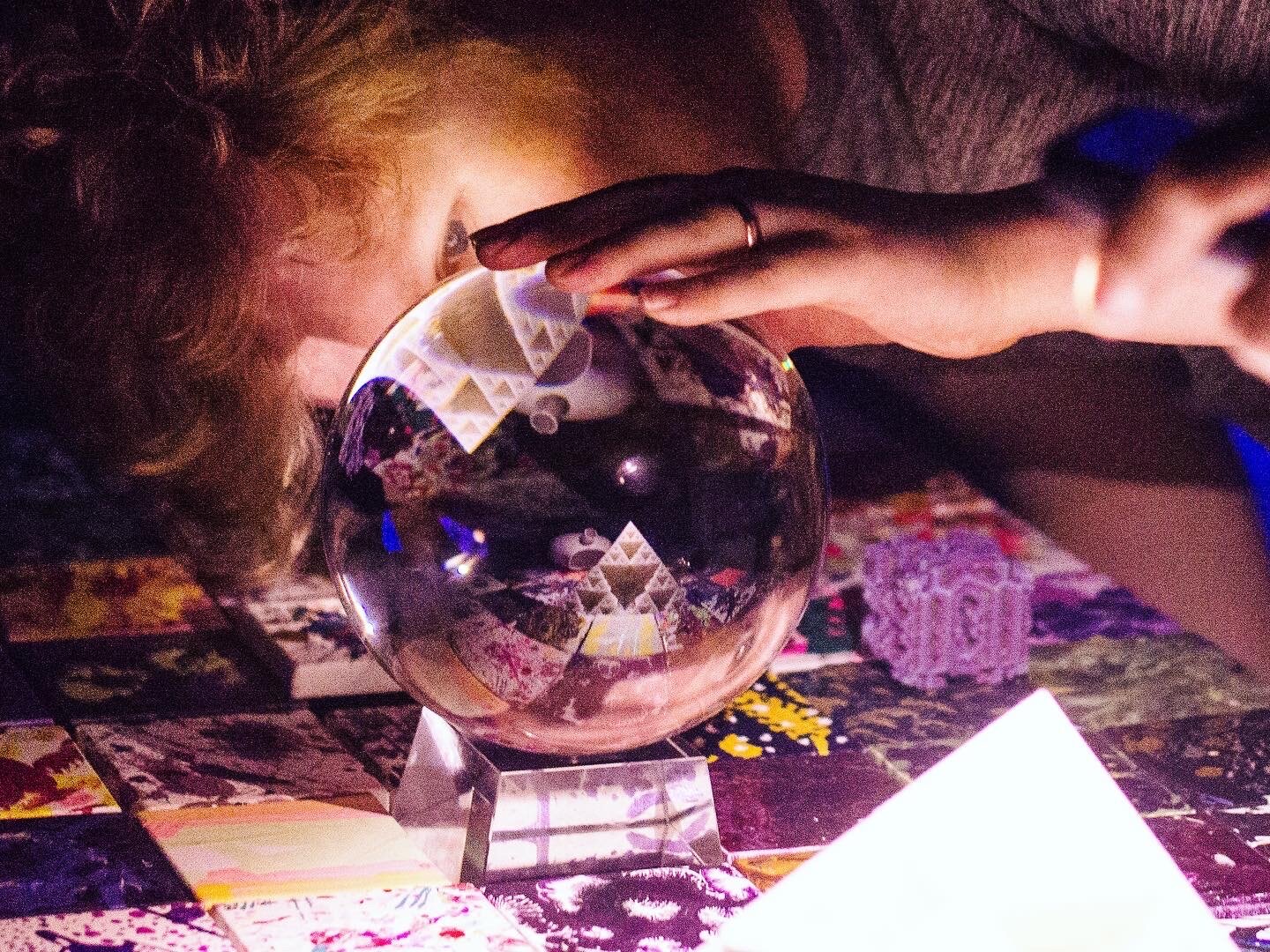
DUSTIN CHAN
Interview published May 26, 2021
Dustin Chan 陳子平 is a multi-disciplinary artist and designer who has worked on everything from biomaterials, Danish furniture, and ethical consumer technology to 3D printing, art therapy, and coding experimental websites. His art practice serves as a spiritual quest to share and express the sacred space of infinite compassion and love that is the true nature of consciousness. This quest led him to the exploration of fractal geometry, which is what he now spends most of his time investigating. Fractals are forms that exhibit aspects of self-similarity. Every major system in the natural world, human society, and experiences of consciousness all contain fractals at their core. Fractals are intrinsically valuable concepts that have the potential to reveal the secrets of the universe if you know how to pay proper attention.
Hi Dustin! Thanks for joining me at Mint Tea. To begin, what’s your favorite tea?
My favorite tea is attached to one of the experiences that I had when I was in India, actually. When you get chai tea on these little carts, they have these tiny little clay cups that are handmade by people in mass production. And you just throw them on the ground when you're done, because they're biodegradable, and they'll just degrade on the side of the road, which is super interesting. So you just go get this hot little cup of tea, and then you drink it out of this cute little thing, and then just put it on the side of the road. It's really an interesting experience. But at home, probably matcha tea because it's kind of a ceremonial experience, having the little bamboo whisk, and you just froth it up, and then you get to have this nice matcha.
Could you tell me about your background and your practice?
My practice is kind of complicated, but it essentially stems from the fact that I've always been sort of a jack of all trades. I do a lot of things, I've always explored a lot of different hobbies and different types of artistic styles. My first thing that I probably got into was when I was in middle school, I started doing the Chinese diabolo, which is like a giant yo-yo thing, and then I got into like circus stuff. So I did like a bunch of juggling things when I was in high school, and then I got into like singing. Then in college, I studied industrial design, and that was a really helpful education for me, even though I'm not in industrial design anymore. The actual practice is really interesting, because what you do is you find out what you want to achieve. You’ll have a prompt that says, like, “this vacuum cleaner really sucks to us, and people who have carpal tunnel can't use it.” And then you don't know how you're going to get to the end goal, right? Like, you don't know how you're going to make something better, but you try a bunch of different things. That's kind of what I've integrated into my art practice – that I don't specifically choose to do one type of medium. So, I don't specifically splatter paint, I don't specifically sing, or do 3D prints or do renderings, or do meditative drawings or things like that. I will do whatever I think fits the ultimate effect that I want to have on people, which has been very useful for me.
Dustin Chan, “Tesseract,” 2018
Dustin Chan, “Petit Portals,” 2020
What projects are you working on right now?
I'm currently working on two things. So, one that my computers are currently rendering is a VR 360 video, which is going to take a long time to render, like a month to render for three computers. All in total, it's going to be over 120 billion pixels, which is really crazy because each frame has over 33 million pixels in it. I'm rendering a 360 fractal video because I just got a VR headset. I'm also going to get into VR sculpting pretty soon, because there's some projects that I want to work on that make fractals a little bit more relatable in the way that I understand them.
Fractals are these things that are not just abstract shapes that have no significance to us, they actually represent a spiritual aspect of non-duality, which is that everything in the universe is the same thing. Which is a really difficult realization to come to, like in contemplative practice it is one of the highest realizations that you can have, it essentially is enlightenment. But there are certain ways that you can actually be guided to that process through art, and I think fractals are actually one of the greatest ways to do that, especially if you start conceptualizing things around you as fractals. With VR sculpture, one of the things that I want to do is start showing people how I've conceptualized of ideas as fractals and of the organization of the relative points of an idea, and how that creates a full concept. If you have a leaf, there's certain things that you think about when you think of a leaf that calls it to be a fully comprehensive concept. All of those things, in relative conscious space, are what actually is the leaf for you. The leaf itself only exists when you have a perspective and you're looking at it, so then it's actually the perspective that you have in the organization of your ideas that is the leaf. Which is a hallucination, or an illusion of the external world that is not really there.
Another thing that I'm working on is a torus-shaped portal. The torus is a really special shape in the universe, it's one of the most like sacred shapes, because it is like this filter. For me, it is a shape that represents the nature of selflessness, or the nature of enlightenment, because what happens is when a stimulus comes in, it immediately exits. Like a sphere, to me, is the opposite of selflessness. It's like pure selfishness, essentially, where something comes in, and it gets interpreted by this thing, and the stimulus will bounce around, and it'll keep bouncing around for however long. If you have some trauma that existed in your childhood or something, and you keep thinking about it keeps bouncing around right here, because you still have a self. But once you eliminate that self through meditation, or through other techniques, like psychedelics, then eventually you can work towards having a torus field, where you are a filter for the universe. You essentially just become the entirety of the universe, rather than this limited hallucination of a self that is essentially only useful for surviving when you have like competitive biological needs.
I've technically been playing around with VR sculpture itself, where you actually sculpt in a VR environment, and you just look at it in VR. But that's like, not quite as interesting to me, just because VR right now is something that is, it still has like low resolution, and it's a little bit disorienting, which is actually part of the reason that I created that the portal that's at Slow Burn. There's some tools now that are really good for actually doing real sculptures in VR. I think it allows me to do a lot more intuitive digital sculpture instead of what I'm used to with 3D modeling, where it's kind of this process where I feel disconnected to it until I have it 3D printed or something, and I can bring it into my real space. VR space allows you to kind of have that similar understanding, the scale of things and how all the shapes relate to each other, because you can move around it in the way that you're used to navigating the world.
Dustin Chan, “Cosmic Oasis,” 2021, PLA, resin, plaster, acrylic paint, 22 x 22 x 34 in.
I am the most familiar with your 3D models of fractal structures. What inspired you to begin this study of fractal forms?
I'm not sure exactly when I started being interested in fractals. I know that I'd always kind of been aware of what they were, just being a visual artist and being in industrial design, we’re always interested in shapes. I was always looking for the most interesting thing or the best thing, which is really hard to quantify, especially when you're doing art or industrial design, like what's the best shape? How do you know what the best shape is for like any one given thing? For me, what I found is that fractals are this perfect representation of symmetry in as many ways as possible. They're essentially like a fully integrated, self-contained system, where every part of it is the same as all the other parts. You can zoom in any one point, and it's all the same weird little universe, but obviously it's self-contained. The ultimate goal, actually, would be to create one fractal that unifies the entire complex system of the whole universe, which is really difficult to do, obviously.
I'm interested in fractals, because they kind of represent if you would zoom out all the way, or if you have a perfect, unimpeded consciousness, it would be the consciousness of a fractal shape. If you imagine your ideas to be composed of places in relative space, in consciousness, then those relative places are what allow you to exist. Normally, the ideas that are in our minds are not specifically unified, because they're reliant on the rest of the universe to be unified. The reason that, like, a sphere is the way that it is, is because the rest of the universe is the opposite of it. So that's very prevalent in our minds, like, we are not perfect people because we have not eliminated ourselves, and so we're relying on the connection to the rest of the universe. But fractals are the representation of having achieved that full unity, holistically among your own conscious system.
I’ve always thought that beauty comes from something that achieves symmetry. What do you think is beautiful? What is beauty?
To me, essentially, it is symmetry. The way that I put it, because of my exploration of fractals, is the integration of systems. Essentially, every complex system is a fractal of some sort, especially when it's viewed from the perspective of the mind. The more completely integrated something is to more systems, the more beautiful it is. So, this definition of beauty is useful because it goes across different fields. It can be musical beauty, it can be aesthetic beauty, or it can be ideological beauty. If you're working on some interesting data science problem, there'd be a beauty there of finding the perfect right algorithm for the data that you have, there is this pure, systemic beauty of finding that thing. The end goal, in my opinion, of not just my art practice, or my spiritual practice, is really the same end goal that is pursued by everyone in the world trying to achieve happiness, or all the religions trying to achieve this pure selflessness, or even natural selection trying to achieve this pure integration between these disconnected parts that have become aware of themselves. Which is so weird, like, the universe became aware of itself, and it's running around, reproducing, like, what the hell, you know?, So all these little parts, and science, and medicine, and all these pursuits of humanity, or nature, or the universe, are all really just going towards systemic integration. And that system might differ depending on which pursuit you're following, but the ultimate goal is really to unify every single complex system in the entire universe, which would be really difficult. I think that's the goal of every pursuit ultimately.
Dusin Chan, “Yoni,” 2020
Dustin Chan, "Petit Portals," 2016
Dustin Chan, "Petit Portals," 2015
Dustin Chan, "Petit Portals," 2016
What is religion to you?
So religion is like a complex system of beliefs and traditions that are built upon the fundamental nature of the mind. I don't actually care that much about any one individual religion, because I think they all are different methodologies to achieve the same thing. Essentially, the core tenet of Buddhism is what they're all trying to achieve. Because Buddhism isn't really based around any religion, there’s this idea that, like, Jesus was a Buddha, Muhammad was a Buddha, there's all these people who were Buddhas, because they had achieved this type of higher consciousness. Really, what that goal is, is to eliminate the hallucination of yourself, or of this specific perspective that causes you to latch on to things that are positive. You become attached to these sensations that are pleasurable, or you become averse to things that are negative, and if you get rid of those attachments and aversions, you can kind of slowly eliminate yourself to the point where you become one with the entire universe. Right now, while having a self, you are limited to specifically the perspective that you are hallucinating, essentially. But the more you eliminate that self, whether it's through psychedelics, or meditation, or any other type of contemplative practice, like art, then you start to see things more for what they actually are, which is that everything has the potential to be anything. A pancake is not a pancake, right? It's only a pancake because of the previous life experiences you've had, which is causing it to be a pancake. If you were just born today, and you saw a pancake, it would be the most awe inspiring thing in the world, because you've never experienced anything else. It is everything in the entire universe, and there's no difference from the rest of the universe and that pancake because you don't know anything else. Essentially, it's going back to that that state of innocence in a way where you are aware of the full potential of every experience that you might be able to have.
Then there's like a lot of other weird things that some religions have talked about. Once you get past that stage, there are really weird things that could happen, apparently, but I don't think we have any verification of these things happening, like becoming a rainbow body and escaping. But I think really the first, main part of religion is that belief, and trying to like eliminate the self. There's all these different ways, but at least in Buddhism, mostly the way that they do that is through trying to cultivate compassion for other people, and trying to essentially live your life in service of trying to make the world a better place, rather than living your life in service of trying to make your life better, because you're just going to die. So you will die, so it doesn't really matter, anything that you have is almost totally pointless, because you're trying to build up these things as an extension of yourself, which is what a lot of the Western world does. But it's ultimately futile because when you leave this earth, you're not going to have anything to show for it if all you've done is like just amassed like a bunch of stuff or named a bunch of things after yourself.
Dustin Chan, Detail of 3D printed model
Dustin Chan, "Utopian Emanations," 2020
Dustin Chan, “Yin and Yang,” 2019
Dustin Chan, "Scared Sculptures”
Dustin Chan, "Sacred Sculptures”
Can you talk about the relationship between your digital practice and your sculptural works? How does working in multiple media affect your practice?
I usually try and figure out what I want to do first, or the effect that I want to have on people, and then work backwards from there. So whether or not it's digital or physical, usually that doesn't matter that much. The difference in working with the media definitely is very helpful. Even for me, singing is very important in my practice, because it gives you this type of like immediacy of attention. All of these different types of practice that I do give you a different type of understanding of the space of attention that you can have. Like, music, I think, is the most immediate, and you're dealing with slow waves, so you can like experience them as they're modulating and harmonizing with each other and doing weird things, which is what light is doing in the same way, but just much, much faster, so it's hard to actually perceive it.
Physical sculptural stuff result is really nice, when I'm working with clay, because it's teaching you how to use your hands in a real way where you're not just like typing on a keyboard which gets so repetitive. Doing digital stuff, I'm not being a human. By typing on a keyboard, I'm accessing this power of technology, but the full human potential is like dancing around and running around, screaming random stuff at the top of your lungs. You can you can do all these things, you have all these like sense organs, you should use them to the full extent and play with your fingers. Sculptural stuff allows me to do that. Same with splatter painting, it's such a specific type of attention that I've not found with other things, which is why I do it. It's this immediate type of compositional awareness and flow. You put this one splatter here, and now in this other corner, maybe it needs a little bit more orange or something. It’s this very intuitive awareness of this compositional space that you are manifesting from the depths of your consciousness.
Digital work is great, because it allows me to access like all this amazing technological society that we have built up as humans. The stuff that I make digitally, especially fractals, has taken so many different innovations to get to that point of being possible that it's really totally insane. Without any one of those things, without Mandelbrot actually having come up with fractals, or Steve Jobs pushing so that more people would have computers in their lives, or Xerox creating digital windows that you can move around in digital space... even just being able to manufacture some of these basic materials. All of those things throughout the entirety of human history essentially have led up to the point where we can do these amazing things on computers now. It also allows me to play around with things that are purely selfless. Like a computer is selfless, right? It’s not impeded by itself in doing things, which is awesome. I wish I could do that, like, when I'm trying to paint something perfectly, it never comes up perfectly because I have these thoughts in my head. You always have weird things, because you’re a human, just running around, trying to do something, and it just doesn't work exactly perfectly, because you're a human. Like, if you try and paint a perfect circle, you just can't do that, right? You can almost paint a perfect circle, but a computer will paint, within the pixels, a perfect circle or a perfect square. That's really great with fractals, specifically, because if I was trying to paint a fractal, I have no idea how to do that.
The computer itself is like this meditative processor that can exactly be like, given the color constraints and the lighting constraints that you set up for me, this pixel should be exactly this color. And this next one should be exactly this color in relationship to that one. And it can do that for like, you know, millions of pixels continuously forever, because it is this selfless being that that you can just use as a tool. It’s really interesting to be able to work with like digital mediums that don't have that organic type of impedance. So for me, it's actually two different opposing things, where fractals that are rendered by computers are these more perfect things that are ideal, and are these self-contained systems that are not necessarily connected to the rest of the world, because they were created by a selfless system. But when I create something, because of my entire history of who I am as a person, where I came from, how my parents decided to get together, how my grandfather decided to escape from North Korea, all those things coming to a combination in my mind causes it to be more connected to the rest of the universe, coming at it from a standpoint of the ideal versus the current moment.
Dustin Chan, "Sunrise Mandala," 2020
Dustin Chan, "Sunset Mandala," 2020
When you create your images what is the first thing that you think about? Color? Composition? Subject matter?
The fractal renderings that I make are very process based, so it's kind of like playing around with the possibilities of the different equations. The nice thing about the software that I use, which is Mandelbulb 3D, is that when you're finding compositions, you're actually, like, flying through the equations, which is super fun. I wish it rendered high resolution, so it could be like you're actually flying through it, but in very low resolution, you go forward and backwards, you navigate and turn the camera and whatnot. It kind of feels a little bit like you're navigating through this fractal universe, and then you can also change the parameters of the equations, and change which combinations of equations you're using. It’s kind of this process of figuring out what exists that is super interesting.
Sometimes I'll start with, like, “Oh, I want to find something that represents like the Eastern idea of yin and yang.” Sometimes it will be that I create super interesting images, and then later try and figure out how that fractal relates to certain beliefs in the spiritual world. Sometimes I'll just create something fun just for explorative practice, but if I'm trying to create something specifically for one type of experience, it's usually a lot more difficult. It helps a lot to have that intuitive kind of splatter painting process, especially because fractals are so abstract, that I really need to have a very defined understanding of the weird, fuzzy emotional space that I'm trying to capture. I'm just playing around with these things, and I won't necessarily know when I've gotten it unless I'm really paying attention to exactly the right composition and exactly the right colors. It's very interesting to try and do that with abstract digital rendering, because it takes so much of this specific type of intuitive abstract attention.
How much do you think the digital programs that you use affect your work? Do you find them limiting in any way?
Yeah, for sure, it always imposes limitations, but I don't necessarily view them as any different than the physical limitations of painting versus sculpting, or drawing versus painting. There's two main fractal programs: Mandelbulb 3D is the one that I use for CPU-based renders, and you kind of fly around, which is more fun, and there's Mandelbulber, which is GPU-based, and I don't have a very good GPU, so I'm even limited by hardware that I have. They have different types of things that they can do, there's different like, environments that you can place things into in Mandelbulber, and it's also been supported for longer so there's, there's more rendering things you can do, but the interface isn't as good, which is part of the reason I don't use it. I use Mandelbulb 3D because I feel like the way that it works, works a little bit better with my brain. I do feel like the tools are limiting, but the ultimate goal is always to work with those limitations to figure out something that works really well. I'm not sure if I've fully done that yet with digital tools, but it's always still a process of kind of exploring and figuring out all the different tools and doing a lot of more research.
Dustin Chan, "Ripple Effect," 2020
Dustin Chan, "Temple Grounds," 2020
Dustin Chan, "Labyrinth," 2018
I read on your social media that you went on a fasting meditation journey last winter. How was that? Do you think mediation helps with your creative process?
I kind of view them as the same thing, because you're kind of focusing your attention. Meditation specifically is obviously without distraction, essentially. That's useful, because it's just the specific act of trying to improve the focus of your attention, or calm your mind. You're just working with your mind and understanding the nature of your mind a little bit more, which is very useful for anyone in any pursuit, not just art. But creating art is different because it is meditation engaged with the external world. You’ve got to figure out how to move your hand to perfectly create the stroke that you want, or figure out how to sculpt exactly the right thing that you want with your palm. So it is something where it's this specific type of attentional thing.
I had previously done a pure fasting thing, where I didn't eat for seven days, a few years ago, that was very interesting. And I also had done a 10 day meditation camp, twice actually, as well. But there wasn't anything available during COVID, so I kind of made my own thing, which was just a seven day fast and meditation thing. In the future, I probably won’t be combining them because it's a little bit distracting to be super hungry, and not eat and be meditating, and all I can think about is how hungry I am. But it's very useful because you end up you end up clearing your mind in ways that, before you do it, it's very difficult to put into words how much more expansive your consciousness feels afterwards, or how much better you feel. After the first time that I had not eaten for seven days, I felt like I was kind of like a superhuman, because your body, if you're constantly eating, is always digesting food. So there's always some blood that's not in your brain, right? It's just going around in your stomach and trying to help you like create more energy for later. When you have that ability to fully be at peak awareness, that maybe you've never experienced in your entire life, if you were always fed since you were a baby, it's really something pretty incredible. And it's also part of like our human experience, right? When we were growing up, hundreds of thousands of years ago, as foragers, we would have long periods of fasting as well. So it is supposed to be a healthier methodology of living is to take a few fasts, either in your life, or every week some people do a day fast, which I might start doing at some point as well.
Yeah, and meditation is kind of a similar thing where, before you meditate, you probably are always in this constant state of distraction. We are always distracted by something, you're always following those thoughts to their endpoint, because you don't know any better because you have what's called a monkey mind. You have to tame it, and the only way to do that is through like meditation. A lot of people find different types of meditative techniques, right? Art is definitely one of those big ones, where you can fully focus on something and clear out your mind and get rid of all the external distractions. But meditation is great, because it's just that that pure act of eliminating all those external distractions so you can be more fully equipped to do whatever you want to do. The great thing about meditation, too, is thatit's not based on someone wanting to achieve something specific. Anyone who meditates will get whatever benefit is best for them, assuming they're putting legitimate effort into it. In that moment, based on the systems you're involved in, based on the things you do, and based on what the content of your mind is, which is really crazy and amazing. It's also similar to psychedelics, but psychedelics take you to a much more intense place immediately, and it might be a little bit riskier. They can be useful tools, but I think meditation is a much more direct and sustainable way of trying to achieve a quieter mind.
Dustin Chan, “Chronicle of the Secret Garden,” 2019
Dustin Chan, “Chronicle of the Secret Garden,” 2019
What is your favorite color? Are there specific colors that you like to work with in your images?
I really like white, because it's the most like healing color, and it contains all the colors. It’s a representation for all the things that are higher. So, in the traditional representation of the chakras, there's red all the way through the rainbow up until violet or white at the top. There are chakras that go higher too, but they're like ultraviolet light, gamma, and X-rays. There's chakras that are lower than red, as well, and those are usually represented as black, and they're like infrared. So white to me represents just the entire spectrum of all the different types of energy that that someone can have, or that exist in the universe. When I am doing work, I'd like to work with all the colors, but white as well. Ideally I would be creating work for not just humans, and then create the full spectrum that all the different animals on the earth can see. Maybe aliens too, but like, I don't know what they can see, so who knows about that? What if they just telepathically communicate?
Is there a new medium that you would like to try, or to work in more?
I just got a VR headset, and I'm kind of experimenting a little bit with that. I'm trying out Tilt Brush, which is just a painting thing. It's a free application that was made by Google. It's so weird, because you're just like painting in three dimensions. It's really fun, and that's my precursor to eventually to eventually moving into VR sculpture. I've never really liked doing digital sculpture before, because it feels kind of dehumanizing, and I can't feel it, so I don't really know what I'm doing in relationship to my human experience, but with VR sculpture, it's much more accessible, so I'm definitely going to be trying that. Also, I want to try to code my own machine learning algorithms to do some generative art, which I haven't gotten into yet, just because it takes it takes a little bit of setup time. There's a lot of people who've already made a lot of code available, and there's some really interesting things that you can do. With one thing called StyleGAN, you can train it on a set of images, and then you can have it generate new images that should fit into that set. So I can train it on all of my art, and, and have it generate new images that are based off of my art that will look like exactly like my art. It's like, it's so it's so crazy, and it's not even that hard to do.
How do you stay connected to your community?
My community is probably not one specific group of people. I just have a bunch of people that I've collected over my life experiences that I keep in touch with. And so it will be through whatever medium ends up being best. You know, like, my art friends will get together, we used to have like parties that were fun, but that now obviously that's not a thing. But a lot of people, it's just texting or getting together playing board games or whatnot. I'll usually do whatever someone else feels is fun, because I can usually try and find fun in whatever is happening.
Dustin Chan in his studio
Dustin Chan with artist Yen Yen Chou
What’s your favorite tool?
I guess, probably Mandelbulb 3D, just because it is so incredible. And it's a free software that's made by these crazy geniuses, and it is that culmination of all of this work that society has done to create this incredible technology that we have now. Just the feeling of using that is pretty amazing. But if it's not that, then probably just my hands, just raw painting. Like when I splatter paint, I like to not even use gloves. It's so much more fun because I can feel everything and really be like, “yeah, I'm doing some art now.” I like doing stuff with my hands because it makes me feel human and it makes me feel like I'm interacting with the world in this real physical way.
What is the space where do you your work?
My main space is probably my bedroom, or office, or you know, plant space. It's like a multipurpose thing, just because there's no space in Brooklyn. I do a lot of my digital work here. I do a lot of rendering and 3D modeling and all my Photoshop and stuff on my computer, and set things up. And then once I need to do anything that's a little bit dirtier. Usually I'll go to my studio, which is a part of Paradice Palase, and there I'll do any kind of epoxying that I need to do or splatter painting and stuff like that. Eventually, I want to have a warehouse space or something. That would be most ideal, but I think that's probably a while off.
Do you listen to anything while you work? What music do you like to listen to?
I listen to a bunch of different stuff. It really depends, like sometimes it's nothing. If I'm really in the zone, I'll probably forget to put something on. Sometimes it will be podcasts just for fun or if I want to explore some type of intellectual conversation. Sometimes it'll be spiritually healing music, like the chakra bowls and stuff like that. There's some playlists that I found that I think are well-curated that contain the specific type of Eastern spirituality music which I really like. Sometimes it'll be music that is really fun to sing along to, so that I can just run around and sing and then paint as well, which is super fun. Like Pentatonix, or acapella stuff like that, because I was in choir, so it's nice to go back to that. I'm a bass, which is really annoying, because none of the songs that are popular are made for my voice, right? If I try and sing one of those songs lower, it just doesn't sound good, because they're not meant for my type of bass voice. But if it's acapella, then I can actually sing along with it, and that's really nice.
If I'm doing collaborative painting – I really like to do that with people because the reason that I paint is not to sell the paintings or to have them up on walls, it's more like action painting based. It's based off of the process of trying to engage in a childlike state of play, and eliminate your adult stupidity of being regimented about the way that the world needs to be, and finding fun, and just playing with these fluids and colors that are interesting. So I try and get other people to do that as well. I'll put on African drum music a lot of times because it's not emotionally specific, but it has a lot of energy to it. If someone doesn't like metal music or rock music or the Eastern spirituality music, then they usually won't care about drum music, because it's just a drum beat. Then they can really get into it, and it'll still have high points and low points of energy that they can go along with as they're painting.
Dustin Chan, “Soulscape,” 2020
Do you have any ritual that helps you get into the zone?
Not specifically. I probably should come up with some, because I think for each different thing that I do, there's like a different mindset. For singing there's a very specific mindset, for splatter painting there’s a very specific mindset, but I kind of just like go into them. Usually I'll do smaller things – if I'm painting, I'll do smaller canvases first, before doing a larger one, just to get into that a little bit. But usually what I just do is, I close my eyes and just meditate for 30 seconds to a minute, just to get into the zone. I think eventually, I'll come up with more specific rituals for the different types of things that I do, because that would be useful, but I haven't really explored that yet.
How do you know when you are finished with your artwork?
So, I don't think art is ever really finished, but at least if I have a specific reason that I'm trying to make it… Like, with the portal, when I was painting that on the interior, the whole goal is that it is totally abstract, and it is so detailed, that you can never hold all of it in your mind, unless you were enlightened essentially. So I had to go for a whole bunch of detail. It looked really good before I added a lot of details. It still looks good, but it looked good, like in in a traditional sense of it was like a professional painting that you could put in a hotel or whatever. But I wasn't going for that, so I specifically had a goal in mind, and once it had approximately reached this state of unity and abstractness and density of color, I stopped going. I do that as well with some of my fractal renderings that I make. I make some really large fractal renderings, but they're very large, like 300,000 by 300,000 pixel images. For those I need to experiment and figure out exactly what might be the best settings, but it takes sometimes weeks to render one of these images, because this there's so much detail in each every one of them. So I need to experiment a little bit at first, and then once it's approximately right, even though I won't know until I actually render the full thing, then I usually just say, “it's fine, it should accomplish the original goal,” and then go for it. But really it could always accomplish the goal better, to the point where everyone would be enlightened when it was looking at it, which I think is the ultimate goal of anything. Like you could write an essay that was so good that someone just read it and just achieved enlightenment and ascended to heaven, right? That would be the ultimate of every single pursuit that you could ever do.
Who are your favorite practicing artists?
Julius Horsthuis, he is probably the best living fractal artist. He makes videos and he does a lot of huge installations. Just looking at his compositions, knowing the software that he's using, it's really incredible the types of shapes that he ends up making and how he ends up creating these cinematic experiences from just this this navigation window that you have on the software. I just definitely look up to him. as a source of inspiration, and he also has a lot of tutorials that I've used as well.
Lucie Svoboda, her paintings are really interesting, and she has a surprisingly large amount of variety of abstract paintings, which is really cool. I think in my abstract practice, I haven't previously tried to create things that that are like wall pieces, because for me, it's like a meditative practice of trying to really push my level of intuitive attention. Which sometimes creates things that are wall worthy, but I think most people would consider them too distracting or too complicated. Eventually, I do want to start moving towards creating some things that are simpler, and I think my goal would be to create things with the type of depth and complexity that she manages to evoke. Same with Yann Houri. He has like some amazing, really simple, but beautiful gestures, and very large textural pieces as well, which is super awesome. Kind of a mixture of those two is probably what I would want my painting practice to ultimately become, in a few years maybe.
Also, Justin Zoll, he's a microscope photographer. I actually did get a microscope, but it’s broken, so I'm trying to fix it now. I'm really excited for that, because it's so interesting, like the types of worlds that you can evoke from these chemicals, and these random like fractal worlds that are around us all the time. He uses polarized light photography, and so what you can do is you have these amino acids, and you dissolve them in water, and then you let it dry, and it crystallizes. Then when it gets dispersed through the polarized light, there's these rainbow effects that get dispersed throughout the crystals. It's really amazing, and it's super crazy seeing vitamin C, or these weird amino acids that you that are in your body that are constantly keeping you alive. The type of crystalline structures that they form at this microscopic level, it's such a beautiful metaphor for the depth of life, but also they are some of the most beautiful images that I've ever seen, which is really crazy.
What gives you the feeling of butterflies in your stomach?
If someone is super interested in something, then that's amazing. When you find someone who, when they're talking about something, they have this really specific type of attention where you know they've dove really deep into that avenue of thought in their universe, I think that that's absolutely incredible. Through that attention, they're taking you on that journey with them, and you don't need to go through all the steps because they already did it for you, and now they're showing you through that conversation that you're having or that communication or that piece of art that they've made. That type of thing, for me, is the most amazing – when someone is so passionate about something and you can really viscerally feel it.


